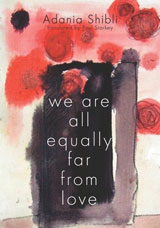By Lauren Khater
We Are All Equally Far From Love
By Adania Shibli
Translated by Paul StarkeyClockroot Books, 2012
As abruptly as this young woman’s love story begins, it ends, and the narrative shifts to Afaf, a young girl who works at a post office, channeling information to her father who is a collaborator. Afaf comes across the letters and keeps them as treasures, flickers of light in her dark life. She lives in a household characterized by her step-mother’s hatred, her father’s cruelty, and the shame brought upon her family when her mother left with another man.
From there, the story moves fluidly into that of a woman who longs to leave her husband for the doctor who cares for her after she suffers abuse at the hands of her spouse. In this transient relationship, she experiences the normalcy of a relationship: laughter, kindness, touch, and healing. As such, “she no longer had any chance but to love him”; yet, her expression of this love wins nothing more than a dismissal, and she is left trying to forget about him.
Next, comes the tale of a man suffering crushing loneliness, who has had only fleeting experiences with love and who cannot even bring himself to interact with the people who come into his store.
Then, we learn of another marriage coming to a close, with both the husband and wife desperately grasping at the ends of their relationship. He desires to be with her, to the point that he threatens rape, and she, desperate to move forward, develops a “ray of hatred” for him.
The final tale in the novel tells of a woman and her family: an indifferent father, an angry and demanding mother, and siblings who care nothing for her. Surrounded by these unnatural relationships, the girl is struck by “a tenderness” in her father’s voice that she had “never heard before” for a woman not his wife. She, too, seeks a relationship that bears more weight than the moment it lasts, but seemingly never finds it.
What makes this novel so beautiful is its eloquent depiction of the ephemeral, fragile, and vital nature of human relationships. There exists between these stories a delicate connection, so exquisitely written as to make the reader wonder whether each fragment is truly divergent from the others or if they are pieces of the same story. In this way, Shibli evokes the universality of our experiences with human relationships, our equal “distance from love,” regardless of where or when a story begins and ends.
This article appeared in Al Jadid Magazine, Vol. 18, No. 67, 2013-2014.
Copyright © 2014 AL JADID MAGAZINE

